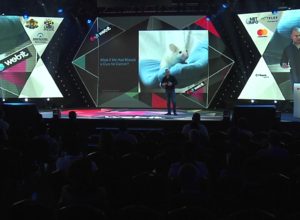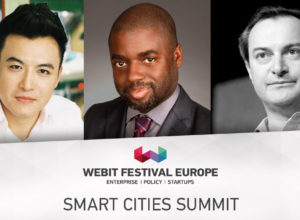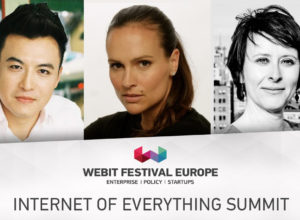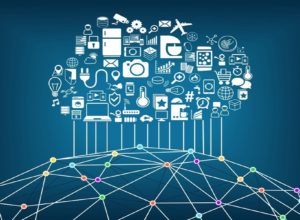Tag: IoE
IoT is the key to solving the complex world of science
We often think about innovation and science as a one whole thing. But in the age of connectivity and information sharing most of the science-based organizations remain disconnected from the Cloud computing and its amazing capabilities.
Fortunately this is going to change fast because of the fast development of IoT solutions that are going to cut the research and development costs of companies and help them invest more into amazing science discoveries that will benefit all of us.
During the IoE Summit of Webit.Festival Europe the Founder and CEO of Elemental Machines Sridhar Iyengar took us on a journey through the process of making science in the Digital Age and shared his vision about overcoming the obstacles that science-based companies face today.
Sridhar also founded AgaMatrix, a blood glucose monitoring company that made the world’s first medical device connecting directly to the iPhone and shipped 15+ FDA-cleared medical products, 2B+ biosensors, 6M+ glucose meters, with partnerships with Apple, Sanofi, and Walgreens. He is a holder of over 30 US and international patents.
His presentation showed our guests how the IoT technologies are accelerating science-based work and are helping for the development of new drugs and products that are crucial for our common future.
Iyengar explained that for investing in science-based organizations is often perceived as too risky for venture capitalists and angel investors. The main reason is that such activity requires serious initial capital and is still full of unknowns.
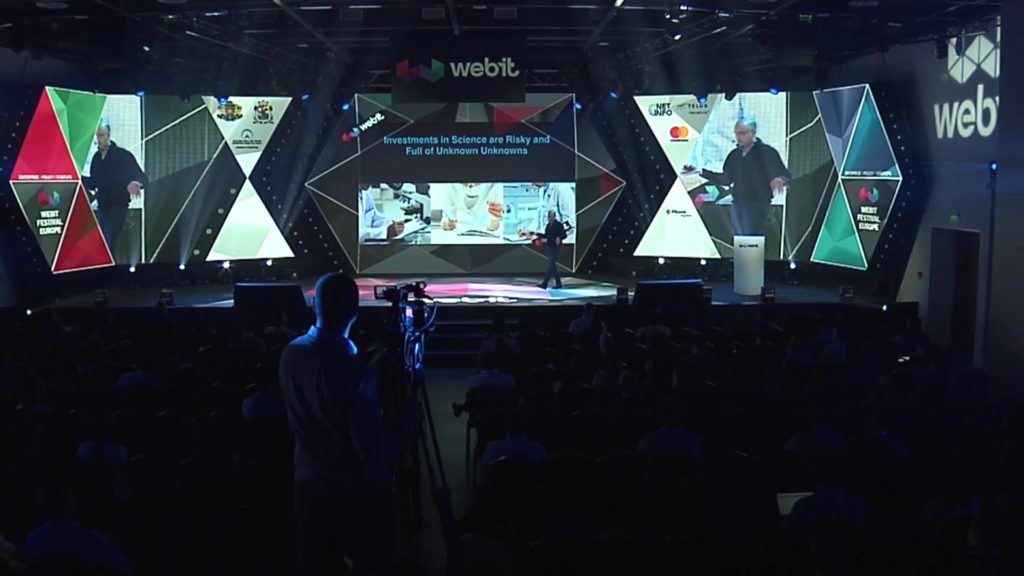 The Founder & CEO of Elemental Machines Sridhar Iyengar[/caption]
Right now pharmaceutical companies invest millions of dollars in research and development, but very little of this scientific world is actually connected to the Cloud. We already have smart homes and devices, and now is the time to develop smart laboratories and factories that are able to share their results and reap the power of cloud computing.
Maybe the best example of that is the San Francisco company Emerald Cloud Lab (ECL), which Iyengar described as “the Amazon for science”. It has developed a fully robotized laboratory. If you have a science experiment you just have to go to their website and code the process and machines will execute it.
The first cloud connected laboratory in the entire world gets the human error out of the equation and guarantees the same results in every execution of the process. In the long-term offering experimentation as service may revolutionize the science-based businesses by cutting their costs and removing the need to develop their own research in development facilities.
Another example of great innovation is the Bay Area company VIUM, which have a digital mouse lab and removes the actual mice from the drug test process. It collect terabytes of data on mice with dozens of sensors.
The Founder & CEO of Elemental Machines Sridhar Iyengar[/caption]
Right now pharmaceutical companies invest millions of dollars in research and development, but very little of this scientific world is actually connected to the Cloud. We already have smart homes and devices, and now is the time to develop smart laboratories and factories that are able to share their results and reap the power of cloud computing.
Maybe the best example of that is the San Francisco company Emerald Cloud Lab (ECL), which Iyengar described as “the Amazon for science”. It has developed a fully robotized laboratory. If you have a science experiment you just have to go to their website and code the process and machines will execute it.
The first cloud connected laboratory in the entire world gets the human error out of the equation and guarantees the same results in every execution of the process. In the long-term offering experimentation as service may revolutionize the science-based businesses by cutting their costs and removing the need to develop their own research in development facilities.
Another example of great innovation is the Bay Area company VIUM, which have a digital mouse lab and removes the actual mice from the drug test process. It collect terabytes of data on mice with dozens of sensors.
“I’m from Boston and biotech companies here raise $40 million as their first round of investment. And most companies don’t raise that much money through the entire process of their existence. Yet if you are going to develop a drug it is going to cost you tens, or even hundreds of millions of dollars”, the expert explained.People who work in technology fields understand Moore’s Law and the fact that the processing power of computers is growing exponentially. But what most of us don’t realize is that in biotech world it is quite the opposite. Eroom’s Law (Moore’s Law spelled backwards) says that as the years goes on the amount of money needed to produce new a single drug is growing. So for every $1 billion dollars that is invested into making a new drug, you get less and less ROI. One of the main obstacles before making science is the fact that every activity is done in the physical world. This creates hundreds of factors that influence and cause variations in the end result. According to Iyengar doing science is very similar to writing code. Working in a laboratory or a manufacturing facility requires following a procedure and a protocol. Code is nothing more than a set of procedures and steps that machine executes. When things co wrong in code, developers have tools, called debuggers. But in science there are no such tools and the debugging process is much harder.
“It is pretty much like baking a cake. You follow recipe, you bake it and supposedly you should get the cake out. If each of us took home the same recipe for chocolate cake and we came back tomorrow, we will probably have dozens of slightly different kinds of cakes, even that we followed the same procedure. In cooking it is okay, but when you are making a drug, it is no”, he said.In software our operating system may be iOS, Windows, Linux or else. But in science-based industry the operating system is the physical world. Because every time doing experiment, every time you test something on a mouse, every time you do a sequence of a genome, the physical world changes. And if you are trying to do the same things in two different days, you have to make sure that all the conditions are the same. This is the most important thing about science - that everything is based on physical properties. When something goes wrong with your final product there are millions things that could have caused why it could went wrong. And finding that is actually really hard and takes a lot of time and resources. [caption id="attachment_5044" align="aligncenter" width="640"]
 The Founder & CEO of Elemental Machines Sridhar Iyengar[/caption]
Right now pharmaceutical companies invest millions of dollars in research and development, but very little of this scientific world is actually connected to the Cloud. We already have smart homes and devices, and now is the time to develop smart laboratories and factories that are able to share their results and reap the power of cloud computing.
Maybe the best example of that is the San Francisco company Emerald Cloud Lab (ECL), which Iyengar described as “the Amazon for science”. It has developed a fully robotized laboratory. If you have a science experiment you just have to go to their website and code the process and machines will execute it.
The first cloud connected laboratory in the entire world gets the human error out of the equation and guarantees the same results in every execution of the process. In the long-term offering experimentation as service may revolutionize the science-based businesses by cutting their costs and removing the need to develop their own research in development facilities.
Another example of great innovation is the Bay Area company VIUM, which have a digital mouse lab and removes the actual mice from the drug test process. It collect terabytes of data on mice with dozens of sensors.
The Founder & CEO of Elemental Machines Sridhar Iyengar[/caption]
Right now pharmaceutical companies invest millions of dollars in research and development, but very little of this scientific world is actually connected to the Cloud. We already have smart homes and devices, and now is the time to develop smart laboratories and factories that are able to share their results and reap the power of cloud computing.
Maybe the best example of that is the San Francisco company Emerald Cloud Lab (ECL), which Iyengar described as “the Amazon for science”. It has developed a fully robotized laboratory. If you have a science experiment you just have to go to their website and code the process and machines will execute it.
The first cloud connected laboratory in the entire world gets the human error out of the equation and guarantees the same results in every execution of the process. In the long-term offering experimentation as service may revolutionize the science-based businesses by cutting their costs and removing the need to develop their own research in development facilities.
Another example of great innovation is the Bay Area company VIUM, which have a digital mouse lab and removes the actual mice from the drug test process. It collect terabytes of data on mice with dozens of sensors.
“They know how much they sleep, how much they walk around, which direction is their nose pointed, how often they feed. And every single thing is captured, so that when something goes wrong you have a huge database where you can go through and debug what may have happened”, Iyengar said.Тhese are two examples of how IoT, connected devices and cloud computing are being applied to drug discovery and science and research, but there are many more to come. You may watch Sridhar Iyengar’s full lecture here: If you want to keep up with the latest trend in the world of digital economy and technology, then Webit.Festival is the right place for you. Visit our website and book 2 of our Super Earlybird tickets for Webit.Festival Europe 2018 for just €100. Feel the Webit vibe with some of the best photos from this year’s event! [easingslider id="4954"]
Webit.Festival will show you how technology will make our cities smarter
The massive development of digital technology in recent years increased the pressure on the local government officials to invest resources in the integration of multiple information and communication technology and Internet of Things (IoT) solutions in secure fashion to manage their city’s assets.
Urbanisation processes and the proliferation of private automobiles create huge problems for the old infrastructure and have unwanted side effects, such as air pollution and heavy traffic. And although we can’t deal with them all, today’s technologies provide multiple solutions to create a better and more comfortable future for all of us.
By the end of this year, 75% of cities worldwide will fail to take full advantage of Smart City Data and digital assets due to lack of process, project management and change management skills. According to IDC by 2019 30% of urban consumers will use bots or intelligent assistants for multimodal route planning to manage costs, carbon impact and other travel preferences.
At this year’s Webit.Festival you can listen to some of the top experts in this innovative field of digital industry. During the Smart Cities Summit they will share their thoughts on Smart Administration, Smart Mobility and Transport, Smart Energy, Sustainability, Cleantech, Cities' Digital Transformation and City innovation through collaboration with the startup world.
The Summit will be chaired by the Mayor of Sofia Mrs. Yordanka Fandakova. It gathers mayors, municipality administrations, EU Commission and European Committee of the Regions members, Cities Council members, Cities' Agency heads, Smart City solution providers and selected innovative startups from around Europe and aims to address all of the crucial factors that are facing urban administrators in today’s digital world.
At Smart Cities summit you shall meet mayors from Bulgaria, including from Burgas, Varna, Stara Zagora, Gabrovo, Vidin, Yambol, Lovech, Shumen, as well as from the region, such as the mayor of Tirana, Mostar, Rijeca, etc.
Among the partners of the Summit are Sofia Municipality, Oblak.bg, MasterCard, Cisco, The Bulgarian Chamber of Architects, Basscom, BAIT and major Bulgarian and International media.
The event gives unique opportunity for direct access to mayors, deputy mayors, top level municipality administrators and all interested parties within the city administrations responsible for Smart City Solution implementations.
The CIO of the City of Palo Alto Dr. Jonathan Reichental will tell us what happens when we begin to build intelligence into the fabric of how our cities operate and what opportunities present themselves when we are smart about connecting the right things together.
The Director of Technology Evangelism at Built.io Kurt Collins will share his vision about a future, where AI creates and maintains integrations between SaaS services and hardware is a requirement for smart cities.
The CEO of Amyx+ Scott Amyx will explain how to innovate and execute in IoT and how to turn disruption into innovation.
Innovate UK’s Interim Head of Urban Living & Built Environment Mike Pitts will talk about the challenges before urban populations around the world and how cities can satisfy the needs of their citizens.
The Global Managing Director for Smart Cities of Cisco Systems Amr Salem will share his expectations about the growth opportunities driven by improving the quality of life for citizens, and therefore technology functions as a mere enabler to create added value in efficiency.
International Telecommunication Union's Deputy Secretary General Malcolm Johnson will explain his organization's role as the United Nations specialized agency for information and communication technologies.
The Director of Communications and Marketing at Xerox Richard Harris will explain the latest trends in the implementation of intelligent transport systems.
Here you can see a full list of the confirmed speakers at Webit.Festival, while here you can get all the information you need about the tickets for the event.
Take a look at the impact of IoE on our lives...
Tech experts around the world list the Internet of Everything (IoE) as one of the top trends in the digital economy. The term brings together people, processes, data and things to make networked connections more relevant and valuable than ever before and create new opportunities for businesses, individuals and countries.
Expansion of this process is connecting people in more relevant and valuable ways. It helps for converting data into intelligence and making better decisions. IoE delivers the right information to the right person at the right time, while connecting physical devices and objects to the internet.
Many new technologies will enable a wider range of IoE services and some of them will also pose interesting challenges for implementation.
The upcoming 5G tech is intended to enable network operators to evolve their current business models to support a wider variety of relationships with partners and customers in the IoE.
Meanwhile network functions virtualization and cloud technologies have the potential to radically change communications and office environments from physical world to reality where everything is software-based and easy to change.
At this year’s Webit.Festival you can listen to some of the top experts in this innovative field of digital industry. During the IoE Summit they will share their thoughts on the development of IoT, Smart Homes, M2M, Wearables, Education Tech and Virtual and Augmented Reality.
The CEO of Amyx+ Scott Amyx will show how to successfully execute in IoT and how to turn disruption into innovation. The expert is winner of the Cloud & DevOps World Innovation award and was voted among the top IoT Influencers & Experts by Inc. Magazine.
Right after him, the CEO of Elemental Machines Sridhar Iyengar will show us how IoT is helping solve the complex world of science and will explain why smart devices are still not a part of every research laboratory.
The Global Editorial Director of Wall Street Journal Custom Studios Fara Warner will speak on the best ways to tell a story in the world of virtual and augmented reality from media’s point of view.
Josh Software’s Co-founder Gautam Rege will share his thoughts on the future of smart homes, where everything happens at the touch of a button and how it will affect our quality of life.
The CEO of TechHuddle Richard Yeo will talk about the current state of ecommerce and will give his predictions for the future of IoE.
Meanwhile, the Vice President of SCA for Digital Transformation Gael De Talhouet will tell the audience about the rise of IoT and subscription models and the automation of purchases.
Here you can see a full list of the confirmed speakers at Webit.Festival, while here you can get all the information you need about the tickets for the event.
Blockchain can reshape the world if it deals with its security...
The Blockchain technology has the potential to lower the bank infrastructure expenses by nearly 30% if it is implemented in the right way. This will help the banks worldwide to save between $8 and $12 billion per year. But there are still many questions to be answered before Blockchain becomes the go to tech in the world of big banking, and not only.
The Executive Chairman of Alphabet Inc. Eric Schmidt described it as an incredible achievement of cryptography and said that in the modern era the ability to create something that no one can copy has a great value.
One of the main reasons for success of the internet is the constant changing of the way we transfer data, audio and video. But until now, the global network never had a method for transfer of assets. Blockchain is the technological solution, that made this thing a reality.
But still most people remain skeptical about the libertarian utopia of Bitcoin and the radical philosophy it presents. Of course Blockchain is much bigger than its most recognized cryptocurrency and has the power to be the main tool of the Big Data global infrastructure of the future.
The main concern about Blockchain remains its safety. In December, Forbes reported that hackers have stolen millions of dollars in Bitcoin, using only phone numbers. Unfortunately, unlike the credit card transactions, the transfers of cryptocurrency is irreversible.
Recently even the big industry players, like venture capitalists and entrepreneurs were hit by a wave of Bitcoin scams. Most of them are done by a phone number highjacking and changing the passwords of email accounts and bank profiles.
This type of security weakness can be used against anyone who is using their phone for services as Google, PayPal, Dropbox, Facebook, Twitter and iCloud.
In the period between 2017 and 2021 the expenses for cybersecurity worldwide will surpass $1 trillion, compared to only $81.6 billion for 2016. Meanwhile experts predict that in 2021 the total cost of cybercrime damages is gonna be around $6 trillion - double than the $3 trillion in 2013.
With the expanding of IoE we can expect around 50 billion connected devices by the end of the decade, and all of them will need to be secured. By 2020 the volume of data in internet will be around 50 times bigger than it is today.
The connected future of the world present many opportunities, but along with them will come the serious risk for our privacy and personal and financial safety.
To learn more on the topic of cyber security and privacy, visit the Security & Privacy Summit within Webit.Festival Europe. Top level speakers from all over the world will share their experience during the event, which is held on 25 and 26 of April in Sofia. You can listen to the CEO of LSEC-Leaders in Security Ulrich Seldeslachts, the CEO of Intel Security for EMEA region Raj Samani and the Co-Founder of Distil Network Rami Essaid.
During the Webit’s FinTech & Blockchain Summit speakers like the Executive VP for Global product strategy of Wirecard Christian Von Hammel-Boten and the venture capital investor and CEO of Novus Ordo Capital Liliana Reasor will share their views on topics, such as the future of payments and the ventures, driven by digitalization.
Digitalization will make healthcare more efficient and cheaper
Today the state of multitrillion dollar healthcare worldwide is inefficient, bureaucratic and too expensive. But all this could change thanks to the implementation of exciting new technologies for digitalization of health.
The time has come for the healthcare industry to follow transport’s suit and to embrace disruptive innovators like Uber and Lyft, who used the full potential of mobile technology to revolutionize the taxi industry.
Thousands of startups, along with giants like Google, IBM, Apple, Samsung and many others are entering the new market for Digital Health and will totally transform the way people are treated today.
All this will lead to healthcare, which is much cheaper and effective, experts believe that in the next 10 years this will be the most transformed industry in the world. Part of the reason is the rise of IoE devices, which will give medics accurate and live information about our health status.
Wearables now monitor everything from blood sugar to blood pressure, medication, weight and levels of activity. According to recent research the medical device industry market, which totaled about $5.1 billion in 2015 will almost triple by the end of decade.
Better monitoring, including devices and home visits, can lower the need of hospitalization and lead to huge cost savings. The CVS Health Research Institute calculated that deployment of remote devices and using their data could save as much as $63 million per 100 000 patients with high cholesterol and diabetes.
Digital healthcare investment already has gone through several different waves. In 2013 the market was all about consumer wearables, in 2014 we saw the rise of healthcare big data. 2015 was the year of virtual care delivery and in 2016 we saw some development in payer disruption.
But this year we can expect a return to developing technology that enables providers of health services to extend their reach and take greater risks.
Recently the World Health Organization (WHO) announced the forming of an expert committee, that will create guidelines for countries and implementers on how to use digital health strategies to improve reproductive health outcomes.
Disruption of the healthcare industry will require continued movement towards a more value-based model, which will help for improving of preventive medicine, patient-centered and patient-powered care and reduced costs.
If you want to keep up with the hottest trends in the world of digital health Webit.Festival is the right place for you. During the Health & Wellbeing Summit, you can listen to top level speakers such as the Consultant surgeon & Co-founder of Virtual Medics and Medical Realities prof. Shafi Ahmed. He is the first doctor who streamed a live operation using Google Glass to 14 000 students in 2014.
IoE makes us dream of a more connected tomorrow
We are living in the time of the Fourth Industrial Revolution - a process that unites biological, digital and physical spheres. And perhaps the most important condition for unfolding of this process is the coming age of Internet of Everything (IoE).
According to most experts, it will bring an enormous shift on our way of living, solving problems and creating value for business. In the near future our cars, houses, fridges, stoves, light bulbs, clothes and visual devices will all be interconnected.
This has the potential to create new capabilities, richer experiences and unprecedented economic opportunity for businesses, countries and individuals.
A Business Insider analysis calculates that by 2020 there will be around 34 billion devices connected to internet worldwide, compared to 10 billion in 2015. Internet of Things (IoT) devices will account for 24 billion, while traditional computing devices as smartphones and tablets will be around 10 billion.
Over the next five years the market for IoT solutions will reach nearly $6 trillion. Business is looking like the top customer of this kind of products because of the perspective for lowering of operation costs, increased productivity and expanding to new markets.
By year 2020 more than 5 billion people will be connected to the web. This is nearly seven times more than their number in 2000. The new internet users will come mainly from Africa and Asia and their connection will be mobile. This creates entirely new economic reality, which is already happening.
Just yesterday the idea of smart homes was interesting mostly for geeks and wealthy executives from the tech industry. But platforms like Amazon’s Alexa are soon going to make this concept affordable for nearly everyone in the developed world.
With the coming of more people online, companies like Google are trying to make their services more accessible with smaller apps for budget devices and offline support.
Today the tech giant announced that its Google search app for Android will save our queries while we are offline and deliver the results when our internet connection is established again.
As Android is the most used operating system in developing economies where the internet quality is low this new feature will be pretty helpful for the millions of new users. Soon the company is going to apply it for iOS too.
Meanwhile, Google is working with LG on producing the first Android Wear 2.0 devices - the LG Watch Sport and LG Watch Style. The smartwatches will be revealed on February 9. Both devices have options for Wi-Fi and Bluetooth connectivity, while the sport model features cellular connectivity with 3G and LTE data, as well as GPS.
As for now the expansion of wearables benefits mostly retailers and technological businesses, but the new features in these devices have the potential to improve our day-to-day activities and quality of life.
IoE will make us more self aware in every life aspect of life, from eating habits and sport to management of our home and finances.
You can learn more about the rise of mobile tech, sharing of information and connected devices during Webit.Festival 2017. During the two-day agenda of the festival in Sofia you can listen to top level speakers from all over the world, who will share their experience on topics, such as Marketing & Innovation, Big Data & Cloud, IoE, Digital Transformation, FinTech & Blockchain, Security & Privacy, Health & Wellbeing and Mobility.
